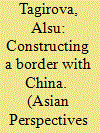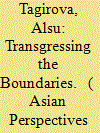| Srl | Item |
| 1 |
ID:
192954


|
|
|
|
|
| Summary/Abstract |
The Russian and Soviet governments believed the border to be a social and political construct. They often described and considered it as a foreign policy issue and a point of military vulnerability. In the course of 70 years of Sino-Russian relations since 1949, the border turned from a porous imperial fringe to a line of defense, a zone of economic growth, and a zone of economic anxiety. Throughout this evolution process, the Russian central government failed to grant agency to the local authorities and indigenous communities. The article argues that the current Russian federal government entrusts the local government with two conflicting goals in the borderlands: building strong cross-border ties and maintaining a "strong vertical of power" with top-down management and absolute supremacy of national security matters.
|
|
|
|
|
|
|
|
|
|
|
|
|
|
|
|
| 2 |
ID:
190827


|
|
|
|
|
| Summary/Abstract |
After the fall of the USSR, the newly established republics had to finish negotiating the bilateral border issue with China. These states chose to have the talks as a joint delegation of post-Soviet states. They also each experienced pressure from domestic constituencies. Viewing the entire negotiation process as a three-level game, the paper argues that in all four post-Soviet states the national governments believed the cost of ‘no agreement’ with China on the border issue to be so high that they chose to risk dealing with complex issues at home over passing up the opportunity to settle the border with their strongest neighbour. They did so with little regard for domestic opposition or the restrictions posed by the previous commitments on the supranational level.
|
|
|
|
|
|
|
|
|
|
|
|
|
|
|
|
| 3 |
ID:
161500


|
|
|
|
|
| Summary/Abstract |
After World War II, suffering from a severe workforce shortage and unprecedented economic devastation, the Soviet Union encouraged the immigration of Chinese citizens from Xinjiang into Soviet Central Asia. Despite the arbitrary behavior of local authorities, the immigrants were successfully integrated into Soviet society. But after 1963, many of the Chinese “defectors” began to be considered a threat to national security, and the KGB (Committee of State Security) arrested a good number of them. I argue that the Sino-Soviet split affected the mentality and immigration policies of the Soviet Union, much like current relations between China and the Central Asian states shape the attitude of the latter toward new arrivals from China. This article is based on research in the Kyrgyz and Kazakh archives.
|
|
|
|
|
|
|
|
|
|
|
|
|
|
|
|